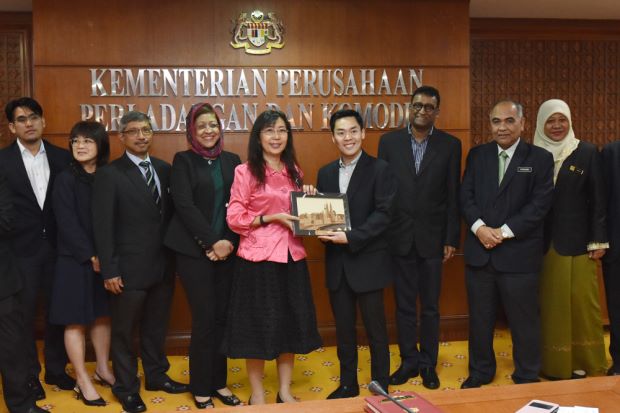
Primary Industries Minister Teresa Kok presenting a memento to Indigo after his briefing to the ministry. Also there were PGEO Marketing General Manager Chandra Naidu (third from right), Ministry of Primary Industries Secretary-General Datuk Zurinah Pawanteh (fourth from left), Malaysia Palm Oil Board Director-General Datuk Dr Ahmad Kushairi Din (second from right) and Ministry of Primary Industries Deputy Secretary-General Ravi Muthayah (third from left).
KUALA LUMPUR: There should be no concern that the use of biodiesel will affect vehicle engines as proven by the implementation of the biodiesel programme in Indonesia, said Wilmar International
In allaying concerns by Malaysian hauliers and automotive manufacturers on the implementation of the biodiesel programme in Malaysia, Wilmar International’s country head in Indonesia, Darwin Indigo said they had been carrying out the biodiesel programme for four years without any adverse effects to vehicle engines.
During a recent briefing with Malaysia’s Primary Industries Ministry, Indigo shared Indonesia’s experience and said it was “really possible and good” for Malaysia to implement its B10 (blend of 10% palm methyl ester and 90% diesel) programme for the transport sector.
Also present at the briefing was Primary Industries Minister Teresa Kok.
Indonesia, the biggest palm oil producer in the world, introduced its B10 biodiesel programme in 2014, followed by the B15 program in April 2015 and B20 program early 2016.
“In the beginning there was reluctance by vehicle manufacturers but the Government set the rules and by the second year everyone supported the programme,” he said.
He said most vehicle manufacturers in Indonesia currently still provide engine warranty for use of B20.
“If the plantation trucks in Indonesia can run on bad roads and terrains there, it would be no problem for vehicles running on biodiesel plying normal conditioned roads,” Indigo added in a statement by the ministry.
Another factor, he said, was that besides regulations, Indonesia also imposed penalty on petrol stations and diesel producers for non-compliance.
A penalty of 6000 rupiah per liter of diesel is imposed for non-compliance and with strict enforcement and monitoring, the programme has been a success,” he said.
Wilmar is one of the biggest biodiesel producers in the republic and works closely with the Indonesian government in its B20 programme.
Wilmar exports biodiesel products to United States, Europe, India and China.
During a recent briefing with Malaysia’s Primary Industries Ministry, Indigo shared Indonesia’s experience and said it was “really possible and good” for Malaysia to implement its B10 (blend of 10% palm methyl ester and 90% diesel) programme for the transport sector.
Also present at the briefing was Primary Industries Minister Teresa Kok.
Indonesia, the biggest palm oil producer in the world, introduced its B10 biodiesel programme in 2014, followed by the B15 program in April 2015 and B20 program early 2016.
“In the beginning there was reluctance by vehicle manufacturers but the Government set the rules and by the second year everyone supported the programme,” he said.
He said most vehicle manufacturers in Indonesia currently still provide engine warranty for use of B20.
“If the plantation trucks in Indonesia can run on bad roads and terrains there, it would be no problem for vehicles running on biodiesel plying normal conditioned roads,” Indigo added in a statement by the ministry.
Another factor, he said, was that besides regulations, Indonesia also imposed penalty on petrol stations and diesel producers for non-compliance.
A penalty of 6000 rupiah per liter of diesel is imposed for non-compliance and with strict enforcement and monitoring, the programme has been a success,” he said.
Wilmar is one of the biggest biodiesel producers in the republic and works closely with the Indonesian government in its B20 programme.
Wilmar exports biodiesel products to United States, Europe, India and China.